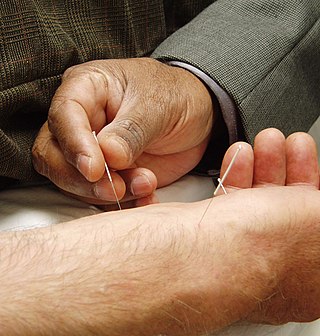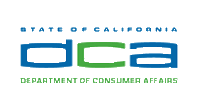
Acupuncture is a form of alternative medicine and a component of traditional Chinese medicine (TCM) in which thin needles are inserted into the body. Acupuncture is a pseudoscience; the theories and practices of TCM are not based on scientific knowledge, and it has been characterized as quackery.

A medical license is an occupational license that permits a person to legally practice medicine. In most countries, a person must have a medical license bestowed either by a specified government-approved professional association or a government agency before they can practice medicine. Licenses are not granted automatically to all people with medical degrees. A medical school graduate must receive a license to practice medicine to legally be called a physician. The process typically requires testing by a medical board. The medical license is the documentation of authority to practice medicine within a certain locality. An active license is also required to practice medicine as an assistant physician, a physician assistant or a clinical officer in jurisdictions with authorizing legislation.

Robert ("Bob") Fellmeth is an American lawyer. He is a tenured Professor of Law at the University of San Diego School of Law, holder of the Price Chair in Public Interest Law, and executive director of the Center for Public Interest Law and the Children's Advocacy Institute.

The California Department of Consumer Affairs (DCA) is a department within the California Business, Consumer Services, and Housing Agency. DCA's stated mission is to serve the interests of California's consumers by ensuring a standard of professionalism in key industries and promoting informed consumer practices. The DCA provides the public with information on safe consumer practices, in an effort to protect the public from unscrupulous or unqualified people who promote deceptive products or services.
Dry needling, also known as trigger point dry needling and intramuscular stimulation, is a treatment technique used by various healthcare practitioners, including physical therapists, physicians, and chiropractors, among others. Acupuncturists usually maintain that dry needling is adapted from acupuncture, but others consider dry needling as a variation of trigger point injections. It involves the use of either solid filiform needles or hollow-core hypodermic needles for therapy of muscle pain, including pain related to myofascial pain syndrome. Dry needling is mainly used to treat myofascial trigger points, but it is also used to target connective tissue, neural ailments, and muscular ailments. The American Physical Therapy Association defines dry needling as a technique used to treat dysfunction of skeletal muscle and connective tissue, minimize pain, and improve or regulate structural or functional damage.
Miriam Lee was one of the pioneering acupuncturists in the United States and was responsible for acupuncture being legalized in California.

The California High-Speed Rail Authority (CHSRA) is a California state agency established in 1996 pursuant to the California High-Speed Rail Act to develop and implement high-speed intercity rail service, namely the California High-Speed Rail project. The CHSRA succeeded the California Intercity High-Speed Rail Commission, which was created in 1993.

The Naturopathic Physicians Licensing Examinations (NPLEX) are professional licensing exams administered by the North American Board of Naturopathic Examiners (NABNE). Graduates of naturopathic programs accredited by the Council on Naturopathic Medical Education (CNME) are required to pass the exams before being permitted to practice naturopathic medicine in a U.S. state or Canadian province that licenses naturopaths.
Regulation of acupuncture is done by governmental bodies to ensure safe practice.
The Federation of State Medical Boards (FSMB) of the United States is a national non-profit organization that represents the 71 state medical and osteopathic boards of the United States and its territories and co-sponsors the United States Medical Licensing Examination. Medical boards license physicians, investigate complaints, discipline those who violate the law, conduct physician evaluations, and facilitate the rehabilitation of physicians where appropriate. The FSMB's mission calls for "continual improvement in the quality, safety and integrity of health care through the development and promotion of high standards for physician licensure and practice."
The Oklahoma State Department of Health (OSDH) is a department of the government of Oklahoma under the supervision of the Oklahoma Secretary of Health. The department is responsible for protecting the health of all Oklahomans and providing other essential human services. The OSDH serves as the primary public health protection agency in the state.
The California Contractors State License Board (CSLB) was established in 1929 as the Contractors License Bureau under the Department of Professional and Vocational Standards. Today it is part of the California Department of Consumer Affairs (DCA).

The Medical Board of California (MBC) is a state government agency which licenses and disciplines physicians, surgeons and certain allied healthcare professionals in California. The Board provides two principal types of services to consumers: (1) public-record information about California-licensed physicians, and (2) investigation of complaints against physicians.

The California Board of Accountancy (CBA), created by statute in 1901, is a semi-autonomous State of California agency under the California Department of Consumer Affairs whose purpose is to protect consumers by ensuring only qualified licensees practice public accountancy in accordance with established professional standards in California.
The Texas Medical Board (TMB) is the state agency mandated to regulate the practice of medicine by Doctors of Medicine (MDs) and Doctors of Osteopathic Medicine (DOs) in Texas. The Board consists of 12 physician members and seven public members appointed for a six-year term by the Governor and confirmed by the Senate. The full Board is required to meet at least four times a year but customarily convenes five times a year. Typical Board business includes interviewing licensure candidates, considering disciplinary matters and adopting substantive and procedural rules. Additionally, Board committees address a variety of important issues.
The Nevada State Board of Medical Examiners is a state agency of Nevada that regulates and administers licenses to physicians, practitioners of respiratory care, physician assistants, and perfusionists who wish to practice in Nevada. The agency is headed by a board, with its current president being Rachakonda D. Prabhu. The Nevada State Board of Medical Examiners is headquartered in Reno, Nevada. It is a member of the Federation of State Medical Boards.
The California Bureau of Real Estate Appraisers (BREA) is a division of the California Department of Consumer Affairs responsible for real estate appraiser licensing and certification in California.

The Oregon Medical Board (OMB) is the agency of the government of the U.S. state of Oregon responsible for establishing the rules and regulations governing the practice of medicine in Oregon. The Board's office is located in Portland, Oregon. It is a member of the Federation of State Medical Boards.
The Florida Board of Accountancy (FLBOA) regulates Certified Public Accountants and Certified Public Accounting Firms for the State of Florida. The FLBOA is created in Florida Statutes Chapter 473 and is administered by the Florida Department of Business and Professional Regulation (DBPR). Florida Statutes Chapter 473 permits the FLBOA to establish rules that are codified in the Florida Administrative Code (FAC) in sections 61H1-19 through 61H1-39.
The Medical Licensing Board of Indiana is a state government agency that licenses and disciplines physicians, surgeons and other healthcare professionals in Indiana. It is a member of the Federation of State Medical Boards.











